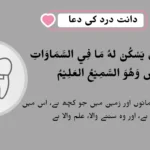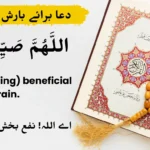Forgiveness holds immense significance in Islam, as it purifies the soul and strengthens the bond between a believer and Allah. Dua for forgiveness is a heartfelt plea to seek Allah’s mercy, repent for sins, and cleanse the soul. This article will guide you through powerful supplications, their meanings, and the importance of turning to Allah for pardon.
| Amar Bil Maroof wa Nahi Anil Munkar Meaning in Urdu |
| Khana Khane Ke Baad Ki Dua After Eating |
| Darood e Taj: Powerful Verses You Need to Know |
| Ayat e Kareema: Benefits of Ayat e Kareema |
Dua For Forgiveness in Arabic with Transliteration, English, and Urdu Translation
1. Astaghfirullah Wa Atubu Ilaih
- Arabic: أَسْتَغْفِرُ اللَّهَ وَأَتُوبُ إِلَيْهِ
- Transliteration: Astaghfirullah wa atubu ilaih
- English Translation: “I seek forgiveness from Allah and repent to Him.”
- Urdu Translation: “میں اللہ سے معافی مانگتا ہوں اور اس کی طرف توبہ کرتا ہوں۔”
This concise yet powerful dua serves as a daily reminder to seek Allah’s forgiveness sincerely.
2. Rabbi Ghfir Li, Warhamni, Wahdini, Wa’afini, Warzuqni
- Arabic: رَبِّ اغْفِرْ لِي وَارْحَمْنِي وَاهْدِنِي وَعَافِنِي وَارْزُقْنِي
- Transliteration: Rabbi ghfir li, warhamni, wahdini, wa’afini, warzuqni
- English Translation: “O my Lord, forgive me, have mercy on me, guide me, grant me health, and provide for me.”
- Urdu Translation: “اے میرے رب! مجھے معاف کر دے، مجھ پر رحم فرما، مجھے ہدایت دے، مجھے عافیت دے اور مجھے رزق عطا فرما۔”
This dua encapsulates multiple requests, demonstrating the comprehensive nature of Islamic supplication.

3. Allahumma Innaka Afuwwun Tuhibbul Afwa Fa’fu Anni
- Arabic: اللَّهُمَّ إِنَّكَ عَفُوٌّ تُحِبُّ الْعَفْوَ فَاعْفُ عَنِّي
- Transliteration: Allahumma innaka afuwwun tuhibbul afwa fa’fu anni
- English Translation: “O Allah, You are Forgiving and love forgiveness, so forgive me.”
- Urdu Translation: “اے اللہ! تو معاف کرنے والا ہے اور معافی کو پسند کرتا ہے، پس مجھے معاف کر دے۔”
This profound dua is particularly recited during Laylatul Qadr, emphasizing Allah’s attribute of forgiveness.

Understanding Each Verse for Seeking Forgiveness
1. The Power of “Astaghfirullah Wa Atubu Ilaih”
This short yet meaningful supplication is ideal for daily use. It represents a believer’s acknowledgment of their sins and their intention to abandon them. Regular recitation reinforces humility and accountability, essential traits in strengthening one’s faith.
Key Benefits:
- Promotes mindfulness of Allah.
- Instills a habit of seeking forgiveness.
- A simple way to attain mercy and cleanse the heart.
2. “Rabbi Ghfir Li” – A Comprehensive Plea
This dua is not limited to forgiveness. It highlights the beauty of Islamic supplication, where a believer asks for mercy, guidance, health, and provision in one powerful sentence.
Key Benefits:
- Demonstrates reliance on Allah for all needs.
- Covers spiritual and material blessings.
- Encourages gratitude and dependence on the Creator.
3. “Allahumma Innaka Afuwwun” – Focusing on Allah’s Attribute
This dua is particularly significant during Ramadan and special nights, reminding believers of Allah’s immense mercy. By reciting this, one appeals to Allah’s forgiving nature and expresses hope for His pardon.
Key Benefits:
- Aligns with Allah’s preferred attributes.
- Strengthens faith in divine forgiveness.
- Encourages sincerity in repentance.
Why Should We Regularly Recite Dua for forgiveness?
1. Cleansing the Soul
Duas for forgiveness act as a spiritual cleanser, removing the burden of sins and bringing peace to the heart.
2. Strengthening the Bond with Allah
Seeking forgiveness fosters a deeper connection with Allah, as it reflects sincerity, humility, and trust in His mercy.
3. Enhancing Accountability
Regularly seeking pardon makes one more conscious of their actions, fostering self-discipline and responsibility.
Practical Tips for Making Duas Effective
- Be Sincere: Approach Allah with genuine regret and a firm intention not to repeat sins.
- Use Allah’s Beautiful Names: Address Allah with His attributes, such as Al-Ghaffar (The Forgiving) and Al-Afuww (The Pardoner).
- Consistency Matters: Make seeking forgiveness a daily habit, especially after Salah and during quiet moments.
- Combine with Good Deeds: Follow up your duas with acts of charity, kindness, and devotion.
The Benefits of Daily Istighfar: A Guide to Seeking Forgiveness
1. The Importance of Istighfar in Daily Life
Istighfar, or seeking forgiveness, is a daily necessity for every Muslim. It shields from hardships and opens doors to blessings.
2. The Role of Repentance in Islam
Repentance (Tawbah) is a direct act of returning to Allah. It shows a believer’s willingness to amend their ways and seek Allah’s mercy.
FAQs:
The dua “Allahumma Innaka Afuwwun Tuhibbul Afwa Fa’fu Anni” is highly recommended, especially during Ramadan, as it highlights Allah’s forgiving nature.
Yes, Islam encourages praying for others, including asking Allah to forgive their sins. It is an act of compassion and mercy.
Ensure sincerity, recite with humility, use Allah’s beautiful names, and follow up with good deeds and efforts to avoid repeating sins.
By regularly reciting these duas, you can purify your soul, strengthen your connection with Allah, and experience inner peace. Start today and embrace the transformative power of sincere supplication.





I always emailed this weblog post page to all my contacts,
for the reason that if like to read it afterward my contacts will too.